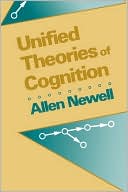Unified Theories of Cognition
Search in google:
Psychology is now ready for unified theories of cognition—so says Allen Newell, a leading investigator in computer science and cognitive psychology. Not everyone will agree on a single set of mechanisms that will explain the full range of human cognition, but such theories are within reach and we should strive to articulate them.In this book, Newell makes the case for unified theories by setting forth a candidate. After reviewing the foundational concepts of cognitive science—knowledge, representation, computation, symbols, architecture, intelligence, and search—Newell introduces Soar, an architecture for general cognition. A pioneer system in artificial intelligence, Soar is the first problem solver to create its own subgoals and learn continuously from its own experience.Newell shows how Soar's ability to operate within the real-time constraints of intelligent behavior, such as immediate-response and item-recognition tasks, illustrates important characteristics of the human cognitive structure. Throughout, Soar remains an exemplar: we know only enough to work toward a fully developed theory of cognition, but Soar's success so far establishes the viability of the enterprise.Given its integrative approach, Unified Theories of Cognition will be of tremendous interest to researchers in a variety of fields, including cognitive science, artificial intelligence, psychology, and computer science. This exploration of the nature of mind, one of the great problems of philosophy, should also transcend disciplines and attract a large scientific audience. Booknews After reviewing the foundational concepts of cognitive science--knowledge, representation, computation, symbols, architecture, intelligence, and search--Newell makes the case for unified theories of human cognition by setting forth a candidate: Soar, an architecture for general cognition. The author contends that Soar is the first problem solver to create its own subgoals and learn continuously from its own experience, as well as having the ability to operate within the real-time constraints of intelligent behavior. Annotation c. Book News, Inc., Portland, OR (booknews.com)
IntroductionThe Nature of TheoriesWhat Are Unified Theories of Cognition?Is Psychology Ready for Unified Theories?The Task of the BookFoundations of Cognitive ScienceBehaving SystemsKnowledge SystemsRepresentationMachines and ComputationSymbolsArchitecturesIntelligenceSearch and Problem SpacesPreparation and DeliberationSummaryHuman Cognitive ArchitectureThe Human Is a Symbol SystemSystem LevelsThe Time Scale of Human ActionThe Biological BandThe Neural Circuit LevelThe Real-Time Constraint on CognitionThe Cognitive BandThe Level of Simple OperationsThe First Level of Composed OperationsThe Intendedly Rational BandHigher Bands: Social, Historical, and EvolutionarySummarySymbolic Processing for IntelligenceThe Central Architecture for PerformanceChunkingThe Total Cognitive SystemRI-Soar: Knowledge-Intensive and Knowledge-Lean OperationDesigner-Soar: Difficult Intellectual TasksSoar as an Intelligent SystemMapping Soar onto Human CognitionSoar and the Shape of Human CognitionSummaryImmediate BehaviorThe Scientific Role of Immediate-Response DataMethodological PreliminariesFunctional Analysis of Immediate ResponsesThe Simplest Response Task (SRI)The Two-Choice Response Task (2CRT)Stimulus-Response Compatibility (SRC)Discussion of the Three AnalysesItem RecognitionTypingSummaryMemory, Learning, and SkillThe Memory and Learning Hypothesis of SoarThe Soar Qualitative Theory of LearningThe Distinction between Episodic and Semantic MemoryData ChunkingSkill AcquisitionShort-Term Memory (STM)SummaryIntendedly Rational BehaviorCiyptarithmeticSyllogismsSentence VerificationSummaryAlong the FrontiersLanguageDevelopmentThe Biological BandThe Social BandThe Role of ApplicationsHow to Move toward Unified Theories of CognitionReferencesName IndexSubject Index








